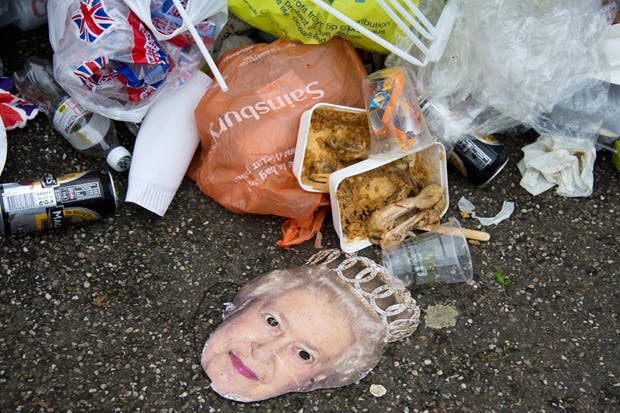I am sure that the Queen disapproves of litter as much as anyone else, but she’s hardly ever exposed to it. There isn’t litter around at Buckingham Palace or at Windsor Castle or at any of her other homes. And when she goes away on a visit, her destination is always assiduously cleaned and tidied up in advance. She is, I suspect, almost the only person in Britain who barely knows what litter looks like. Yet we are all being asked to volunteer to spend the first weekend of March picking up litter everywhere in Britain to make the entire country clean before her 90th birthday in April.
My personal invitation to ‘Clean for the Queen’, as the campaign is called, arrived in the form of an email from the Northamptonshire branch of the Campaign to Protect Rural England (CPRE), which is one of several organisations — Keep Britain Tidy, the Women’s Institute, and so on — that are backing the magazine Country Life in this initiative. ‘Will your village or group Clean for the Queen to celebrate her 90th birthday?’ it challenged.
There is no doubt that Britain has a serious and intractable litter problem; it is one of the most squalid countries on earth. And the problem with litter is that the more there is, the more it generates. If you see litter all over the place, you see no reason why you shouldn’t add to it. Why bother to look for a bin when nobody else does? What difference to the general scene would one more sandwich wrapper make?
The statistics tell a grim story. Thirty million tons of rubbish — enough to fill Wembley Stadium four times over — are collected from the streets of England every year; yet, despite all these efforts and recurrent campaigns to improve matters, it accumulates in ever larger quantities. The amount of litter on British beaches, for example, has almost doubled over the past 15 years. Nor can it be relied upon to vanish of its own accord any time soon. Cigarette butts take up to 12 years to biodegrade, plastic bags up to 20 years, plastic bottles up to 450 years, and chewing gum never biodegrades at all.
So shouldn’t we all jump to and answer the call to Clean for the Queen? Well, maybe we should, but it doesn’t look as if many will. And at least part of the reason for this is that we are irritated at being asked to do it specifically for her. Rory Stewart, the junior environment minister, says: ‘Her Majesty the Queen is an inspiration to all of us. Her 90th birthday is a unique opportunity for people to come together in celebration of Her Majesty’s long service and dedication to this country.’ Perhaps so, but this particular campaign seems more likely to divide people than to bring them together.
There has already been a lot of rebellious babble on the internet. People have been tweeting that they don’t like being treated like serfs or housemaids. They resent the assumption behind the campaign that the Queen among all the people of Britain is the person most upset by the litter she alone doesn’t have to witness. ‘When she came to the throne, litter was not the problem it is today,’ reads the Clean for the Queen website. ‘What better way could we show our gratitude to Her Majesty than to clean up our country?’ You don’t have to be a republican to feel that there could be a better way. You can respect and admire the Queen, and you can believe that Britain is best served by a hereditary head of state, without indulging in deference on this embarrassing scale.
It is an ill-conceived campaign that is unlikely to make any more difference than the other campaigns that have preceded it. Bill Bryson, the American-born lover of the English countryside, who campaigned valiantly but with little success against litter during his five-year spell as president of the CPRE, believes now that there is only one solution — strong government action in the style of Singapore, where fines for littering are ferocious and chewing gum is banned. This could gradually make it a habit for British people to put litter in bins, as it already is for them to fasten their seat belts when they get into cars. ‘They’re not doing it because they want to do the right thing; it’s just habit,’ Bryson says.
Got something to add? Join the discussion and comment below.
Get 10 issues for just $10
Subscribe to The Spectator Australia today for the next 10 magazine issues, plus full online access, for just $10.













Comments
Don't miss out
Join the conversation with other Spectator Australia readers. Subscribe to leave a comment.
SUBSCRIBEAlready a subscriber? Log in